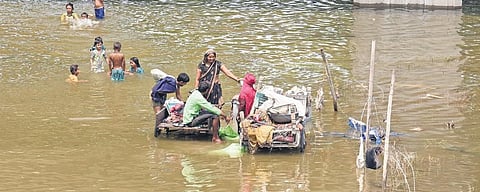

NEW DELHI: The Indian government has clarified that recent flooding in eight eastern districts of Bangladesh is not due to the release of waters from the Dumbur Dam on the Gumti River. The Ministry of External Affairs issued a statement refuting local media and protesters' claims that India was responsible for the flood.
According to the Indian government, the current flooding in Bangladesh is primarily due to heavy rainfall in the catchment area of the Gumti River, which flows through both India and Bangladesh. The statement highlighted that “the flood in Bangladesh is primarily due to waters from these large catchments downstream of the dam.” It further mentioned that “it is factually incorrect to say that the current situation of flood in districts on the eastern borders of Bangladesh has been caused by opening of the Dumbur dam upstream of the Gumti River in Tripura.”
The Dumbur Dam, located over 120 kilometres upstream from the Bangladesh border, is a low-height (approximately 30 meters) dam used for power generation. The dam supplies 40 MW of power to Bangladesh. The Indian government emphasised that the dam’s location and its operational height are not significant enough to cause flooding in Bangladesh.
Heavy rainfall has been ongoing since August 21 in Tripura and adjacent Bangladeshi districts, leading to automatic water releases from the dam. The Indian government operates three water level observation sites—Amarpur, Sonamura, and Sonamura 2—along the river. Amarpur station is part of a bilateral protocol that involves real-time flood data transmission to Bangladesh. Data showing a rising trend was supplied to Bangladesh until 1500 hours on August 21. However, power outages due to flooding at 1800 hours led to communication issues, though efforts were made to maintain communication through alternative means.
The Indian government underscored the importance of river water cooperation between India and Bangladesh, noting that "floods on the common rivers between India and Bangladesh are a shared problem inflicting sufferings to people on both sides and require close mutual cooperation towards resolving them." With both countries sharing 54 common cross-border rivers, India remains committed to resolving water resource issues through bilateral consultations and technical discussions.